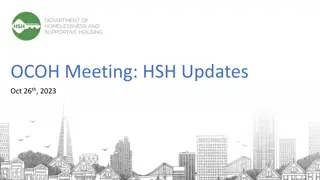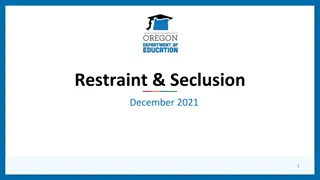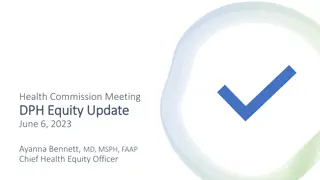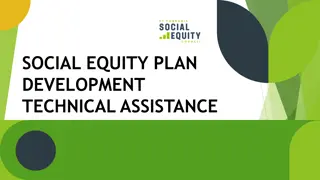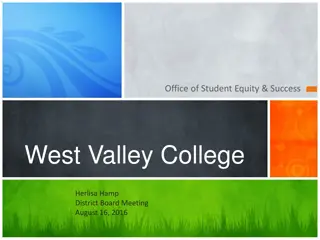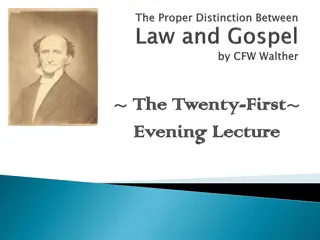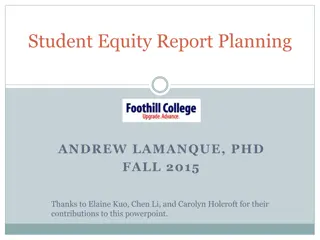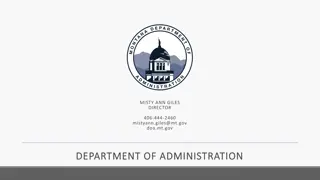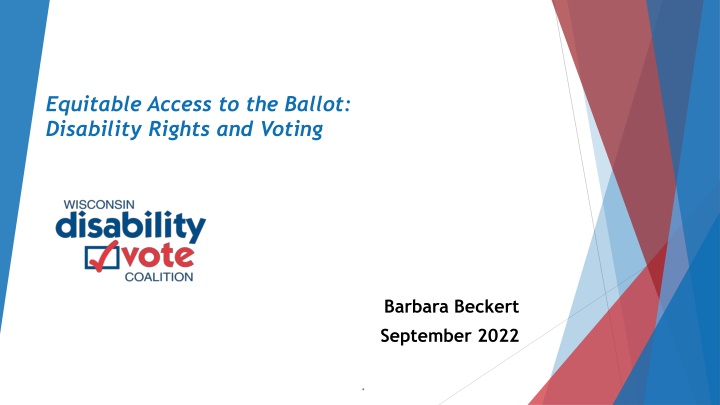
Ensuring Equitable Access to Voting for People with Disabilities
Learn about the efforts to ensure equitable access to voting for individuals with disabilities, historical barriers they face, strategies for protecting voting rights, and resources available through organizations like Disability Rights Wisconsin. Discover the impact of disabilities on voter turnout and the major barriers that need to be addressed to promote inclusivity in the electoral process.
Download Presentation

Please find below an Image/Link to download the presentation.
The content on the website is provided AS IS for your information and personal use only. It may not be sold, licensed, or shared on other websites without obtaining consent from the author. If you encounter any issues during the download, it is possible that the publisher has removed the file from their server.
You are allowed to download the files provided on this website for personal or commercial use, subject to the condition that they are used lawfully. All files are the property of their respective owners.
The content on the website is provided AS IS for your information and personal use only. It may not be sold, licensed, or shared on other websites without obtaining consent from the author.
E N D
Presentation Transcript
Equitable Access to the Ballot: Disability Rights and Voting Barbara Beckert September 2022 .
The Struggle for Equitable Access to Voting: An Update from the Frontlines About the disability vote Historical barriers and new barriers Strategies to protect and defend voting rights Know your rights: voting rights and accessibility Partnering Resources
About Disability Rights Wisconsin DRW is the federally mandated Protection and Advocacy system for Wisconsin charged with protecting the rights of people with disabilities. DRW helps protect the voting rights of people with disabilities, as required by the Help America Vote Act (42 U.S.C. 15461 (2002)) Contact the DRW Voter Hotline for assistance or questions about voting. Open year round. 844-347-8683 / info@disabilityvote.org Join the Wisconsin Disability Vote Coalition, coordinated by DRW and BPDD: https://disabilityvote.org/
Wisconsin Disability Vote Coalition The WDVC is a non-partisan effort to help ensure full participation in the entire electoral process of voters with disabilities, including registering to vote, casting a vote, and accessing polling places. The Coalition is coordinated by Disability Rights Wisconsin and the Wisconsin Board for People with Developmental Disabilities. Members include people with disabilities, over 40 community agencies, and other partners. https://disabilityvote.org/
The Disability Vote Approximately 23% of the electorate in the November 2020 election were individuals with some type of disability, according to AAPD. This is a diverse group of voters: people with sensory disabilities, intellectual and developmental disabilities, physical disabilities, mental health disabilities, complex medical needs, and chronic health conditions. Many older adults have disabilities acquired through aging, although they may not formally identify as a person with a disability. People with disabilities are underrepresented at the polls. The Rutgers University Fact Sheet on Disability and Voter Turnout in the 2020 Elections notes an 11.4% gap in voters with and without disabilities and cites if people with disabilities voted at the same rate as people without disabilities, there would 1.75 million more voters.
Major barriers, historically Accessibility concerns Lack of Photo ID (high percentage of non-drivers) Lack of Transportation (hard to get to DMV) Failure to provide accommodations; limited awareness of accommodations Limited access to internet and technology (digital divide) Housing insecurity, group home or institutional setting Lack of training for poll workers Confusion about voting rights, including for people under guardianship and those with criminal convictions Stigma and discrimination
Post 2020 Election Barriers New bills proposing new barriers and restrictions Absentee voting Indefinitely confined voters Nursing home/ group home voting Restricting assistance More restrictions for those w/felony convictions Constitutional amendments Many investigations Indefinitely confined voters & voting rights of people in nursing homes targeted Attacks on integrity of elections and on election officials Litigation Frequent changes in election law and processes
Impact on Voters with Disabilities of Proposed Bills Prohibit Clerks / WEC and other groups from sending absentee ballot applications to all eligible voters New restrictions for Indefinitely Confined voters. Ex. Eliminates option to receive absentee ballots automatically for every election. Prohibited private funds used to assist municipal elections like when funding was provided to communities for COVID-19 safety protocols Limited who could assist with returning an absentee ballot New restrictions on use of drop boxes Prohibit clerks from correcting ( curing ) a defect on a completed absentee ballot return envelope, such as partial address on the envelope Would be a felony for nursing home staff to offer assistance with voting to residents
Strategies to protect and defend voting rights
Teigen v WEC Plaintiffs filed a motion asking the court to: 1) eliminate the ability of municipalities and counties to use drop boxes to collect absentee ballots; 2) require voters using absentee ballots to personally hand over their ballot to the clerk. Law Forward intervened on behalf of DRW along with our partners LWV of Wisconsin and Wisconsin Faith Voices. DRW provided affidavits from 20 voters as well additional family members and disability agencies re how the ban on assistance with mailing of ballots and return of ballots would disenfranchise voters with disabilities Our Voices Our Votes https://disabilityrightswi.org/wp- content/uploads/2022/04/DRW-Our-Voices-Our-Votes-4-2022-acc.pdf
Carey v WEC August 31: Chief U.S. District Judge James Peterson s order: Confirmed the federal rights of the four plaintiffs and of all disabled Wisconsin voters to receive assistance from a person of their choice to return their absentee ballots. WEC was required to provide written instructions to all Wisconsin clerks stating that: Any Wisconsin voter who requires assistance with mailing or delivering their absentee ballot to the municipal clerk because of a disability must be permitted to receive such assistance by a person of the voter s choice, other than the voter s employer or agent of that employer or officer or agent of the voter s union. Link to Guidance: Guidance on Absentee Ballot Return Options Under the Federal Voting Rights Act | Wisconsin Elections Commission Watch for DRW and DVC document explain absentee ballot return assistance for November 8thelection.
Speaking Out for Voting Rights Elevate the voices of voters impacted Testimony at legislative hearings & WEC meetings Press events Sign on Statements Letters to the editor Earned media Voter statements (Voting Rights Are Human Rights) Surveys Social media, including voter spotlights DRW/ DVC provides legislative analysis, support, and advocacy training Coalition work and partnerships
Training & Outreach to Voters, Service Providers, Election Officials Know your rights: education re federal & state laws Guardianship and voting rights Voting Rights of people with criminal convictions Voting rights of care facility residents Collaboration with allies Partner with WEC to provide resources and training on accessibility and accommodations; polling place accessibility audits
Federal Voter Accessibility Laws Voting Rights Act (VRA) of 1965 Voting Accessibility for the Elderly & Handicapped Act (VAEHA) of 1984 The Americans with Disabilities Act (ADA) of 1990 National Voter Registration Act (NVRA or Motor Voter) of 1993 Help America Vote Act (HAVA) of 2002
Voting Rights Act Provides for voters who need assistance to vote by reason of blindness, disability, or inability to read or write. Any such voter may be given assistance by a person of the voter's choice, other than the voter's employer or agent of the employer or officer or agent of the voter's union. Prohibits conditioning the right to vote on a citizen being able to read or write, attaining a particular level of education, or passing an interpretation test.
Voting Accessibility for the Elderly and Handicapped Act of 1984 Requires accessible polling places in federal elections for elderly individuals and people with disabilities, pre-dating the ADA. Where no accessible location is available to serve as a polling place, voters must be provided an alternate means of voting on Election Day. Creates the right for voters to request to be moved up in line. Voters who are not moved to the front of the line must be in some way accommodated.
ADA and Voter Access Title II of the ADA requires state and local governments ( public entities ) to ensure that people with disabilities have a full and equal opportunity to vote. The ADA s provisions apply to all aspects of voting, including voter registration, site selection, and the casting of ballots, whether on Election Day or during an early voting process. Every option available to voters must be fully accessible to all voters, including in person and remote voting options. Accommodations, like curbside voting and moving up in line, should be used and must be used in some situations.
National Voter Registration Act - Motor Voter and Disability Aims, among other things, to increase the historically low registration rates of persons with disabilities. Requires all offices that provide public assistance or state- funded programs that primarily serve persons with disabilities to also provide the opportunity to register to vote in federal elections. Wisconsin is one of 6 states exempt from Motor Voter, as we have same day registration at polling places. Always a best practice, even in states that offer same day registration. The National Voter Registration Act Of 1993 (NVRA) (justice.gov)
Help America Vote Act Guarantees all voters the right to a private and independent ballot. Jurisdictions responsible for conducting federal elections have to provide at least one accessible voting system for persons with disabilities at each polling place. The accessible voting system must provide same opportunity for access, participation, privacy and independence.
Wisconsin Accessibility Provisions List of Wisconsin Accessibility Provisions 5.25(4)(a) Each polling place shall be accessible to all individuals with disabilities .. 5.25(4)(d) No later than June 30 of each odd-numbered year, the commission shall submit a report on impediments to voting faced by elderly and handicapped individuals to the appropriate standing committees ..In preparing its report under this paragraph, the commission shall consult with appropriate advocacy groups representing the elderly and handicapped populations 5.25(5)(b) Alternative Polling Place 6.79(8) Accommodation State Name and Address 6.82(1)(a) Curbside Voting 6.82(2) Assistance marking ballot 6.86(2)(a) Indefinitely Confined
Voter Rights You have the right to Vote privately and independently Access the polling place, including an accessible route to enter the building Assistance mailing or returning your ballot. Assistance marking your ballot. If voting in person, you can bring someone with you or ask a poll worker for assistance. Poll workers are required to assist a voter upon request. Note: You cannot receive assistance from your employer or from your union representative.
Voter Rights Video and Fact Sheet For information about voting rights, watch the Disability Vote Coalition video Know Your Rights before you vote in person: disabilityvote.org/2019/know -your-rights/ Voting Rights fact sheet: https://disabilityvote.org/2021/ voting-rights-fact-sheet/
Voter Rights-Accessible Voting Machines You have the right to use an accessible voting machine at your polling place. All polling places are required by law to have an accessible voting machine. Note: The law does not require this for early in- person absentee voting. Anyone can (and should) use an accessible voting machine. Learn more about the machines at https://elections.wi.gov/accessible-voting- equipment
Voter Rights Curbside Voting If a voter cannot enter the absentee voting location or polling place due to disability, Wis. Stat. 6.82(1) requires that curbside voting must be available. Tip: contact your clerk in advance to discuss how to access curbside voting. (number to call, bell to ring, honk horn etc.)
Voter Rights Reasonable Accommodations You have the right to ask for reasonable accommodations at the polling place including, a chair to sit on a signature guide a magnifying glass assistance stating your name and address tools to help poll workers interact with deaf and hard of hearing voters such as pen and paper or an easel for announcements.
Voting and Guardianship In Wisconsin, a person under guardianship retains the right to vote unless the court expressly removes it. Election officials, family members, guardians or others may not take away someone s right to vote. The Court s decision regarding the right to vote is recorded on a court form called A Determination and Order on Petition for Guardianship Due to Incompetency. (GN-3170). A copy may be requested from Probate Court in their county (about $2.00 for a copy). The court order will not say that the person has retained the right to vote, however, a box will be checked if the right has been removed.
Voting and Guardianship (cont.) A person who has a guardian and has lost the right to vote may petition the court to restore their right to vote (Wis. Stat 54.64(2)(a)). Resources about voting rights and guardianship, and restoring the right to vote are on the DRW website: disabilityrightswi.org/resource-center/guardianship- and-voting/
An Invitation: Partner with Us Our shared goals: Increase the number of disabled Wisconsinites who are registered to vote and who cast a ballot and participate in our democracy. Ensure that voters with disabilities understand and assert their rights. Advance policies and practices that support accessible and inclusive elections and oppose policies that create new barriers. Choose from the menu of options for partnering with the disability community.
Equity and the Disability Vote: Partnership Opportunities Partner with a disability agency to hold a voter registration event. We can help you find a partner agency. Examples: Disability Vote Coalition email info@disabilityvote.org Aging and Disability Resource Centers (1 in each county) Centers for Independent Living (8 centers) Local Arc chapters NAMI affiliates Autism Society chapters
Equity and the Disability Vote: Partnership Opportunities Order or print Disability Vote Coalition materials from our website: disabilityvote.org Add them to your resource table and share them in your community. Share with schools, colleges, group homes, senior centers, day programs, or as part of a food distribution or vaccine dissemination effort. Our Voter Toolkit 2022 Elections is a good starting point 2022 Election Postcards: View 2022 Postcards here. 2022 Election Posters: View 2022 Posters here. Make Your Plan to Vote: Aug 9th Primary and Nov 8th Fall Election Competency, Guardianship, and Voting in WIsconsin.
Increase awareness of Voting Rights and Accommodations Voting Rights Fact Sheet: View English Voting Rights fact sheet here (accessible pdf). View Spanish Voting Rights fact sheet here (accessible pdf). Know Your Rights Video Report an Accessibility Concern to the WI Elections Commission: View report form here. Refer voters to the Disability Rights WI Voter Hotline: 844-347-8683 / 844-DIS-VOTE
Participate in polling place accessibility audits WEC Election Day Polling Place Accessibility Review program Audits are conducted by DRW staff, WEC staff, and temps. Temps needed for the November elections. WEC provides training and tablets for use, and participants are assigned polling places. You must have your own transportation.
Partner with Us Sign up for the Disability Vote Coalition e-newsletter at disabilityvote.org Follow us on Facebook, Instagram and Twitter. Like and share our posts. Join a Disability Vote Coalition Subcommittee. Email us at info@disabilityvote.org for information about our subcommittees: o Education and Outreach o Voting Rights and Accessibility o Advisory Group on Voting in Nursing Homes and Group Homes
Be an Ally Use the accessible voting machine at your polling place. If you are a poll worker, talk to your peers about how to increase use of accessible voting machine. Best practice is to offer it to all voters. Ask your clerk about serving as a Special Voting Deputy for nursing homes and care facilities. Provide captioning for videos and virtual events so they are accessible to deaf and hard of hearing. Hold events at locations that are accessible. Make your materials more accessible. Use sans serif font, 13 pt or larger font size, and high contrast colors. Include disability related questions in candidate forums.
Next steps What are 2 things you can commit to doing to support the disability vote? Partner with the Disability Vote Coalition: https://disabilityvote.org/
Resources DRW Voter Hotline: 844-DIS-VOTE/ 844-347-8683 email: info@disabilityvote.org Disability Vote Coalition: disabilityvote.org/ www.facebook.com/wisconsindisabilityvote/ Guardianship and Voting: disabilityrightswi.org/resource-center/guardianship-and-voting/ Accessible Voting, Wisconsin Election Commission: https://elections.wi.gov/voters/accessible-voting The Americans with Disabilities Act and Other Federal Laws Protecting the Rights of Voters with Disabilities: www.ada.gov/ada_voting/ada_voting_ta.htm List of Wisconsin Accessibility Provisions



